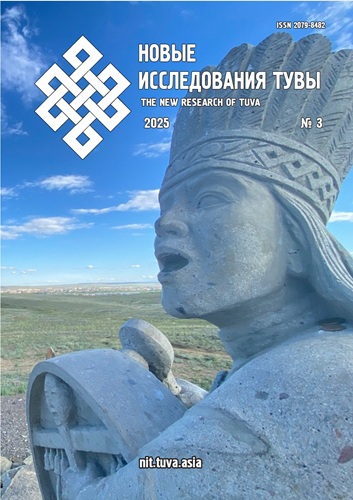Authorial Genre Classifications in Tatar Drama at the Turn of the 20th–21st Centuries
DOI:
https://doi.org/10.25178/nit.2025.3.8Keywords:
Tatar drama; Tatar culture; Tatar theater; authorial genre; intergenre; theatrical experimentAbstract
This article presents an analysis of authorial genre classifications in Tatar drama at the turn of the 20th–21st centuries. This period was marked by significant transformations in the socio-political and socio-cultural life of Russian society. Tatar drama of this era is distinguished by playwrights’ quest for new literary forms, genres, characters, and plots, as they endeavor to express their authorial concepts.
The primary sources of this research are plays by Tatar playwrights written during the specified time frame. A typology of genre classifications in Tatar drama at the turn of the 20th–21st centuries is offered based on the examined works.
It is concluded that the emergence of new (authorial) genre labels for plays is not coincidental but rather represents a form of expressing the creative worldview and perception of Tatar playwrights. Drama of this period is characterized by an interweaving of styles and directions, a diversity of authorial approaches to perceiving the world, and active experimentation with elements of form and content. Synthesis is considered a key vector in the development of Tatar drama, serving as a transitional stage from traditional to new artistic and aesthetic thought.
References
Akhmadullin, A. G. (2012) Tatar Drama: History and Problems. Kazan, Tatar Book Publishing. 511 p. (In Russ.)
Bakhtin, M. M. (1993). The Formal Method in Literary Studies. Moscow: Labirint. 207 p. (In Russ.)
Bakhtin, M. M. (1963) Problems of Dostoevsky’s Poetics. 2nd ed. Moscow, Sovetskii Pisatel’. 800 p. (In Russ.)
Vasil’ev, E. M. (2009) Authorial Genre Designations in 20th-Century Drama. In: Dergachevskie Chteniia–2008: Russian Literature: National Development and Regional Features. The Problem of Genre Nominations: Materials of the IX International Scientific Conference, comp. by A. V. Podchinenov. Ekaterinburg, Ural Univ. Press. Vol. 2. 456 p. Pp. 48–60. (In Russ.)
Gareeva, G. N. (2021) Genre Features of Contemporary Bashkir Drama. In: The Problem of Genres in Philology. Materials of the XVI All-Russian Scientific and Practical Conference. Issue XVII, eds. Sh. A. Mazanaev, Z. M. Bazieva. Makhachkala, Dagestan State University. 349 p. Pp. 78–83. (In Russ.)
Golovchiner, V. E. (2006) Non-classical Drama in Russian Literature. In: Literature and Theatre: Materials of the International Scientific and Practical Conference Dedicated to the 90th Anniversary of Honored Scientist of the Russian Federation, Honorary Professor of Samara State University L. A. Fink, eds. E. L. Fink, L. G. Tytelova. Samara, Samara State Univ. Press. 327 p. Pp. 46–60. (In Russ.)
Goncharova-Grabovskaia, S. Ya. (2003) Poetics of Contemporary Russian Drama (Late 20th–Early 21st Centuries). Minsk, Belarusian State University. 67 p. (In Russ.)
Zakirzyanov, A. M. (2019) Contemporary Tatar Literary Studies: Traditions, Patterns, Searches. Kazan: G. Ibragimov Institute of Language, Literature, and Art of the Academy of Sciences of the Republic of Tatarstan. 372 p. (In Russ.)
Zakirzyanov, A. M. (2020) Authorial Genre Forms in Contemporary Tatar Drama. In: Genre and Stylistic Development of National Literatures in the 20th–21st Centuries: Materials of the International Scientific and Practical Conference. Issue 2, comp. A. F. Ganieva, F. Kh. Minnullina, L. R. Nady rshina. Kazan, G. Ibragimov Institute of Language, Literature, and Art. 314 p. Pp. 145–153. (In Russ.)
Zakirzyanov, A. M. (2024) The Play “Dark Forest” Staged by the Tinchurin Tatar State Drama and Comedy Theatre: Stage Interpretations. In: Screen and Stage Arts in the Context of the Modern Cultural and Educational Process: Proceedings of the International Scientific and Practical Conference, ed. E. M. Galimova. Kazan, Kazan State Institute of Culture. 127 p. Pp. 43–49. (In Russ.)
Zakirzyanov, A. M. and Gabidullina, F. I. (2020) The Motif of “Return” in Contemporary Tatar Drama. Filologicheskie Nauki. Voprosy Teorii i Praktiki, no. 10, pp. 75–79. (In Russ.) DOI: https://doi.org/10.30853/filnauki.2020.10.14
Ivaniuk, B. P. (2007) Genre Synthesis: A Version of Lexicographical Description of the Notion. In: Dergachevskie Chteniia–2006: Russian Literature: National Development and Regional Features. Materials of the International Scientific Conference: in 2 vols. Comp. by A. V. Podchinenov, D. V. Kharitonov. Ekaterinburg, Ural Univ. Press; Writers’ Union Press. Vol. 1. 314 p. Pp. 115–116. (In Russ.)
Kayumova, G. I. (2021) Creative Innovation of Playwright Rizvan Khamid in Embodying the Concept of Personality (on the 80th Anniversary of His Birth). Nauchnyi Tatarstan, no. 4, pp. 57–64. (In Russ.)
Korman, B. O. (1974) An Attempt to Describe Literary Genres in Terms of Author Theory (Subject Level). In: The Problem of the Author in Fiction. Issue 1, eds. B. O. Korman (chief ed.), N. P. Kralina, D. A. Yashin. Izhevsk, UdGU. 230 p. Pp. 219–224. (In Russ.)
Kirillova, I. Yu. (2017) Drama. In: History of Chuvash Literature of the 20th Century: in 2 Parts. Ed. by A. F. Myshkina. Cheboksary, Chuvash Book Publishing. Part 2: 1956–2000. 432 p. Pp. 250–278. (In Russ.)
Kravtsov, N. I. (1972) Problems of Slavic Folklore. Moscow, Nauka. 360 p. (In Russ.)
Leiderman, N. L. (2006) The Problem of Genre in Modernism and Avant-garde (Genre Trial or Trial by Genre?). In: Russian literature of the XX–XXI centuries: trends and trends. Issue 9, ed. N. V. Barkovskaia. Ekaterinburg, Ural Pedagogical Institute Press. 229 p. Pp. 2–31. (In Russ.)
Menshchikova, M. K. (2013) Genre Synthesis in Friedrich Hebbel’s Drama (On the 200th Anniversary of the Writer). Rossiiskii Gumanitarnyi Zhurnal, no. 2, pp. 174–178. (In Russ.)
Minnullina, F. Kh. (2019) The Genre of Drama in Tatar Drama at the Turn of the 20th–21st Centuries. Kazan, IYALI. 144 p. (In Russ.)
Sukhyh, I. (2023) Structure and Meaning. Moscow, Kolibri. 562 p. (In Russ.)
Tynianov, Yu. (1977) Poetics. History of Literature. Cinema. Moscow, Nauka. 356 p. (In Russ.)
Theory of literary genres (2011), ed. by N. D. Tamarchenko. Moscow, Akademiya. 256 p. (In Russ.)
Sharipova, A. S. (2022) Tatar Drama of the 20th–Early 21st Centuries: The Problem of Invariant. Kazan, IYALI. 336 p. (In Russ.)
Khalizev, V. (1999) Theory of Literature. Moscow, Vysshaia Shkola. 398 p. (In Russ.)
Khanzafarov, N. G. (2022) Tatar Dramaturgy: Observations, Creative Portraits: Scientific and Critical Articles [Tatar dramaturgy: images, creative portraits]. Kazan, TaHSI. 264 p. (In Tatar.)
Kherel, A. Kh. (2023) Transformation of the Spiritual and Moral Values of Tuvans in Contemporary Tuvan Drama. Kazanskaia Nauka, no. 11, pp. 200–206. (In Russ.)
Published
How to Cite
For citation:
Minnullina F. Kh. Authorial Genre Classifications in Tatar Drama at the Turn of the 20th–21st Centuries. New Research of Tuva, 2025, no. 3, pp. 112-127 (In Russ.). DOI: https://doi.org/10.25178/nit.2025.3.8
Issue
Section

This work is licensed under a Creative Commons Attribution-NonCommercial 4.0 International License.

Author(s) license holder(s) grant rights for their work to the journal (grantee of a license) under the simple non-exclusive open license in accordance with Art. 1286.1 «Open license for a research work, work of literature or fine arts», Civil Code of the Russian Federation.
New Research of Tuva publishes articles under the Creative Commons Attribution-NonCommercial license (CC BY-NC).
Since it is an open license, author(s) reserve the right to upload the article to their institutional repository, submit it to another journal (if it allows republications), or republish it on their own website (in full, or in part).
However, several conditions apply here:
a) The republished version must always contain the name(s) and affiliation(s) of the author(s), the original title and the hyperlink to the original version on the New Research of Tuva website;
b) It must be in open access, free of charge, and no category of readers must be in any way whatsoever advantaged over general readership.
c) should the contribution be submitted elsewhere by its author(s) without substantial modification (30% or more of original text unchanged), the body of the article should contain a disclaimer that the original version was published in New Research of Tuva (with a link to the respective page)
The CC-BY-NC is a non-revocable license which applies worldwide and lasts for the duration of the work’s copyright.









